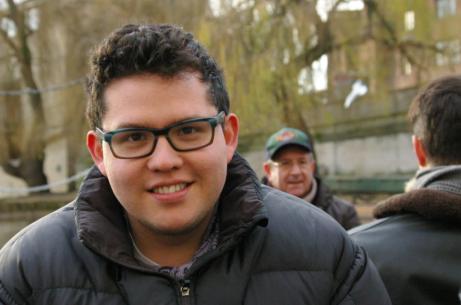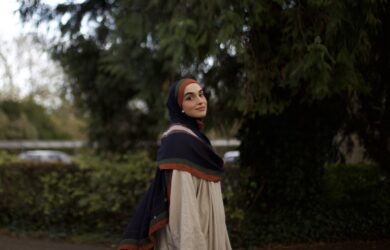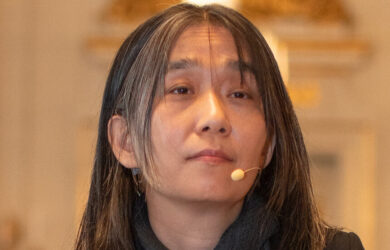
Andres Samayoa's research is on how universities support student communities
How do potentially marginalised students find friendship, support and a sense of belonging at university? Andrés Castro Samayoa [2011] is studying a semi-secret society that existed at the University of Cambridge in the early 20th century for his MPhil on multidisciplinary gender studies.
He hopes his findings will provide information which will prove useful to today’s higher education institutions about how they can help promote friendship and a sense of community among students.
Andrés, who is from El Salvador, says part of his interest in this subject is due to his experience of working as a counsellor contact for students with concerns around issues like sexual health and gender identity at Harvard where he did his undergraduate degree.
“That was really formative for me,” he says. “It showed me the importance of institutional support for those individuals.”
As part of his research at Harvard, he interviewed non-heterosexual alumni from the 1940s about their lives as undergraduates and then won a fellowship to look at the same issue on a more contemporary basis. He says his time at Harvard coincided with a critical moment in the Lesbian, bisexual, gay, transgender and queer [LBGTQ] movement when students were questioning their sexuality more. He played a part in setting up of an LBGTQ resource centre which has just opened.
His Cambridge research will look at early 20th century student life at Cambridge, in particular the semi-secret society known as The Cambridge Apostles. Members included EM Forster and John Maynard Keynes. “It was a discussion group, but there was an element of community and forging friendships,” he says. “A lot of the students had linked with the Bloomsbury Group. Some had sexual relations with each other, but I don’t just want to use contemporary labels for them. I’m interested in how students form communities and in institutional support. In the absence of institutions providing forums for students to come together how do they find each other? My main goal is to find out how institutions could help support this process.”
Andrés was the first Gates Cambridge scholar from El Salvador, but he deferred for a year and when he started he was joined by compatriot, Luis Perez.
Born in Santa Tecla, he lived part of his childhood in Ecuador and Honduras since his father worked for an international company. He, his parents and his older brother lived in Ecuador for four years and Honduras for three during his primary and middle school days and says those periods were “probably one of the most memorable parts of my childhood”. “I got to engage with people with different ideas and different ways of thinking about the world,” he says. This was to prove a boon in his research.
He returned to El Salvador for high school and won a scholarship to the Academia Britanica, a private British school which did the International Baccalaureate. “My family believed that education is the legacy you leave to your children. They made a lot of sacrifices for us to have access to the best education. The school I went to was one of the few in the country which did IB and it allowed me to aspire to higher education and made it more real for me to think of doing so outside of my country,” says Andrés.
Most of the classes he took were taught in English. He became very involved in the model UN group. “Having lived in different countries I had an international outlook and was interested in issues such as conflict and negotiation,” he says. Through the group he attended Harvard, which he says gave him the opportunity to imagine himself being there.
At school his strongest subjects were science and when he started at Harvard he fully intended going into the sciences, either chemistry or neuropsychology. He was one of the first cohorts of students who did not have to declare their major until the middle of their second year.
At the end of his first year, he applied to be an intern at Harvard’s Women’s Centre, which he describes as being “terrifically vibrant”. He was involved in setting up debates around issues such as notions of masculinity and in administrative work, which meant he built up good connections with resource centres around campus – another plus for his research. He returned to El Salvador for the holidays and worked as a volunteer for a group which worked with women with a history of substance abuse.
At around the same time his mentor encouraged him to sit in on science, gender and sexuality classes. “It was a terrific bridge course,” says Andrés. “It was still science, but with a different take on it.” After a lot of reflection and discussion with different faculty leaders, he decided to switch. “I felt comfortable tackling something I had never done before and exposing myself to different ways of thinking about the world that I had not engaged with before,” he says, adding that his course leaders and peers were very supportive. There were only five students on the course which he says gave it a tutorial “Oxbridge-style” feel.
Andrés also spent a lot of his time at Harvard working for the Women’s Leadership Project, a student organisation that brings together undergraduates interested in working on gender and equity issues. “It has a fascinating take on leadership and how to make meaningful change,” he says, adding that he was interested in taking part as a man to challenge the view that “only particular members of communities can provide advocacy in this area”. “I hope we can get to the point where we think of these issues as global ones affecting all genders,” he says, adding that he found their work particularly interesting as someone who came from a community where the kinds of conversations the project was leading were not common. “My work is about starting conversations that are perhaps not being had in some communities. For instance, where I came from we did not have critical conversations about masculinity in ways that did not take male stereotypes as the starting point,” he states.
After his MPhil at Cambridge, Andrés plans to return to the US to do his PhD on more contemporary applications of his research findings.












